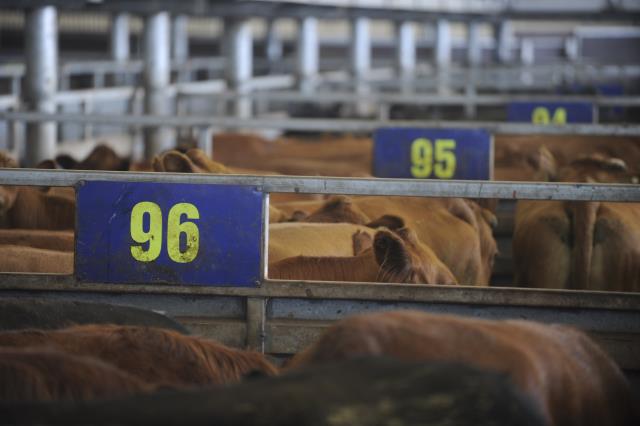By Corey Everitt
Just over three months out until Pakenham’s Victorian Livestock Exchange (VLE) closes, the board held a meeting further explained how the running of the saleyard became ‘unviable’ almost overnight after declining throughput and a land tax which jumped more than 300 percent meaning they ‘can’t fight back’.
VLE held the meeting on Monday 18 March at the saleyards to answer criticisms and explain the situation going forward as the Pakenham’s saleyards are set to close on June 30 with VLE coalescing their efforts around Leongatha’s saleyards.
Founding Chairman Graham Osborne, Current Chairman Chris Sleigh and Managing Director Brian Paynter lead discussion and took questions from around 50 agents and farmers.
Mr Osborne gave a brief history of the VLE, giving insight into how the changing geography of producers in the area has changed since it began in 1997.
At that time, producers in the immediate area; Casey, Cardinia, Mornington Peninsula and the Yarra Ranges, accounted for the majority of throughput in Pakenham.
Yet, Mr Osborne explained production in these areas have dropped by ‘40 to 50 percent’ in the last 10 to 15 years which really ‘hit’ the saleyard.
The saleyard has been able to stay a float over this time as areas like Baw Baw, Bass and Wellington have picked up the slack, but overall the saleyard is not seeing “the fruits of our labour from those of the early days.”
The killing blow came when council rates and land tax skyrocketed late last year, as Mr Sleigh explained.
He explained how late last year, council rates had almost doubled and the tax on the land – which is zoned for industry – jumped by 338 percent, from just under $150,000 a year to over $500,000.
“We didn’t get a three year notice of land tax going up and rates going up, but this is the land, that is what’s happening and we can’t fight back.”
Mr Paynter added to the discussion about how to keep running the saleyard, the duties would jump and would continue after each year.
“We did some calculations and it was at least ten dollars a head per-animal just to keep the place open and that was the tip of the iceberg,” Mr Paynter said.
“This is still under valued in terms of our council rates and land tax, so it just becomes completely un-economical, un-financial and unviable to run a saleyard out of this sight and that’s just a plain fact.”
Mr Osborne also explained how they view the future with Leongatha, where concentrating their efforts will make VLE a part of the major regional centres that are centralising for Victorian producers.
“Whatever we do, we must continue to be a part of the big markets and from the way it will end up there will be one big market in Gippsland, which will be Leongatha, there will be one in Western Victoria in Mortlake and one in the North East which will be Wodonga,” Mr Osborne said.
-Criticisms addressed
Many questions were asked of the board members, one agent asked why there was no discussion with agents and producers on the decision and why there was less than a year of notice.
Mr Paynter said when the dramatic jump in council rates and land tax was revealed in the later half of last year, the decision was a ‘foregone conclusion’.
“The answer is that with the land tax and council rates, the decision was very obvious,” Mr Paynter said.
“We would just continue to bleed, bleed and bleed and to bring the yard duties up next year by $10, $12, it would have been adding another $5 the next year, so the decision was better to be made now.
“The decision was a foregone conclusion, so there was no other option, it was a matter of informing the agents and working with them on the best transition strategy.”
Another asked if VLE could seek out a tax reduction from the State Government, Mr Sleigh said they had sought advice from a lawyer specialised in land tax.
“We paid a lot of money for his opinion and it was completely and utterly negative that we will not get dispensation,” Mr Sleigh said.
A farmer asked how the close will force more spending on producers for transport to Leongatha, Mr Osborne said despite this reality the benefits at Leongatha will see producers getting better rates for their livestock, access to buyers and a reliable saleyard they are committed to in the long-term.
“Everything is cheaper, the land tax on Leongatha is zero,” Mr Osborne said.
“It’s a shock, it’s a change, but I think it’s all doable.”







